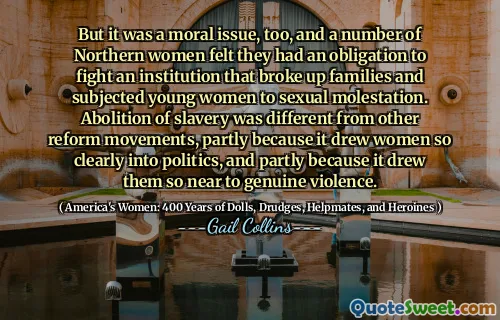
But it was a moral issue, too, and a number of Northern women felt they had an obligation to fight an institution that broke up families and subjected young women to sexual molestation. Abolition of slavery was different from other reform movements, partly because it drew women so clearly into politics, and partly because it drew them so near to genuine violence.
This quote from Gail Collins' America's Women: 400 Years of Dolls, Drudges, Helpmates, and Heroines highlights the profound moral drive that motivated Northern women to actively engage in the abolition movement. It underscores how abolition was more than a political or social cause; it was a deeply ethical battleground that compelled women to confront the harsh realities of slavery—realities not just about labor and ownership but about family destruction and sexual violence endured by enslaved women. This forced many women out of the confines of the domestic and private spheres, traditionally expected of them at the time, and into the public and political arenas.
The quote particularly draws attention to the uniqueness of the abolition movement as opposed to other reform movements because of the way it intersected with gender and violence. It brought women into direct encounter with a form of genuine violence, something that many other contemporary reform efforts did not touch as viscerally. Through this engagement, women experienced a transformation in their societal roles, galvanizing their political voices and activism. The passage also serves as a reminder of how reformist momentum is often propelled by personal and moral conviction, particularly when people's own emotions and sense of justice are impacted. Ultimately, this segment invites reflection on how movements for social justice can reshape not only society but also the participants’ understanding of their own power and place within history.






